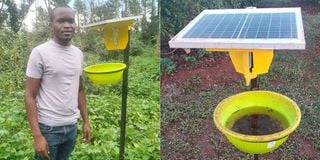Premium
How young innovator is revolutionising pest control

Mutuma Muriuki, the founder of Eco Bristo, stands next to one of his farm's eco-friendly pest traps.
What you need to know:
- Eco Bristo Limited is a start-up committed to revolutionising pest management through sustainable and eco-friendly technologies.
- Each of Eco Bristo’s traps is equipped with sensors that monitor pest activity and can send real-time data to farmers’ mobile phones.
The primary goals of agriculture are to provide sufficient food for the growing population and generate income for farmers and others in the larger economy. To achieve these goals, most farmers rely on chemical pesticides to protect their crops and ensure high yields.
However, widespread use of chemical pesticides leads to serious issues, including disruption of natural ecosystems and pollution.
With this environmental toll and escalating costs for farmers, Mutuma Muriuki wondered if there might be a better way, and if technology could offer an effective solution. He then founded Eco Bristo Limited, a start-up committed to revolutionising pest management through sustainable and eco-friendly technologies.
“I have spent my career working in agriculture and have seen first-hand how pests can decimate crops, wipe out entire seasons of hard work, and leave farmers ruined financially,” Muriuki says.
To him, it was not just about pest control. Farmers needed a solution that would allow them to grow crops sustainably, protect the environment, and keep their families fed. That is when he thought of solar power use.
“Solar energy is abundant in Kenya and offers a sustainable, cost-effective way to power technologies that help farmers fight pests. After extensive research, design and testing, I launched Eco Bristo’s solar-powered pest traps,” Mutuma says, adding that these traps are about a vision of a future where technology and nature work together.
“They work by attracting nocturnal pests — such as moths, locusts, and other flying insects — using solar-powered lights,” he says.
The traps are powered entirely by solar panels, making them energy-efficient and environmentally friendly. Their effectiveness depends on factors such as crop type, pest species, and trap placement.
They require minimal maintenance, and because they run on solar power, they do not need to be connected to the grid. This, Mutuma says, is important for farmers in remote areas where electricity might be scarce or expensive.
Eco Bristo’s traps are integrated with smart technology. Each trap is equipped with sensors that monitor pest activity and can send real-time data to farmers’ mobile phones. This means farmers can check the status of their traps remotely, adjust settings and receive alerts if the traps need attention.
Mutuma acknowledges that creating Eco Bristo was no mean feat. The initial research and development began in 2022, marked by sleepless nights, numerous prototypes and multiple rounds of testing. In 2023, they successfully launched the first traps.
“I spent time talking to farmers, understanding their struggles and learning about the pests wreaking havoc on their crops. We ran multiple trials, adjusting designs and fine-tuning the traps until we got them just right,” he says.
Today, Eco Bristo’s solar-powered pest traps are transforming the lives of farmers all over Kenya. By reducing the need for harmful chemicals and minimising crop loss due to pests, these traps increase yields and allow farmers to focus on growing food sustainably.
He notes that the technology is versatile and effective against a wide range of insect pests.
“Specifically, I have been collaborating with avocado farmers to eliminate false codling moth infestations, resulting in a 50 per cent increase in yield. Additionally, this approach has helped reduce input costs, further enhancing the financial sustainability of their operations,” he explains.
The impact goes beyond just individual farms. Mutuma notes a ripple effect in local communities as more farmers adopt these solar traps. Reduced reliance on pesticides means fewer chemicals in the environment, which helps protect surrounding ecosystems, including the vital pollinators and other beneficial insects.
Since the traps operate on solar power, they also help reduce carbon footprints, promoting more climate-friendly farming. “We design the technology to target the most common and destructive pests in the regions where it’s deployed, including the fall armyworm, false codling moth, diamond black moth, and fruit flies,” he explains, adding that Eco Bristo is just getting started.
“We are constantly innovating, and working on expanding our technology to help farmers manage not just pests, but also water, soil health, and other aspects of sustainable farming. The future of agriculture is smart, green, and connected, and we want to be at the forefront of that transformation,” he says.
The company aims to utilise data analytics and Internet of Things technology to provide farmers with valuable insights into pest behaviour, trap effectiveness, and the best times for intervention. This data-driven approach will enable farmers to make well-informed decisions.





